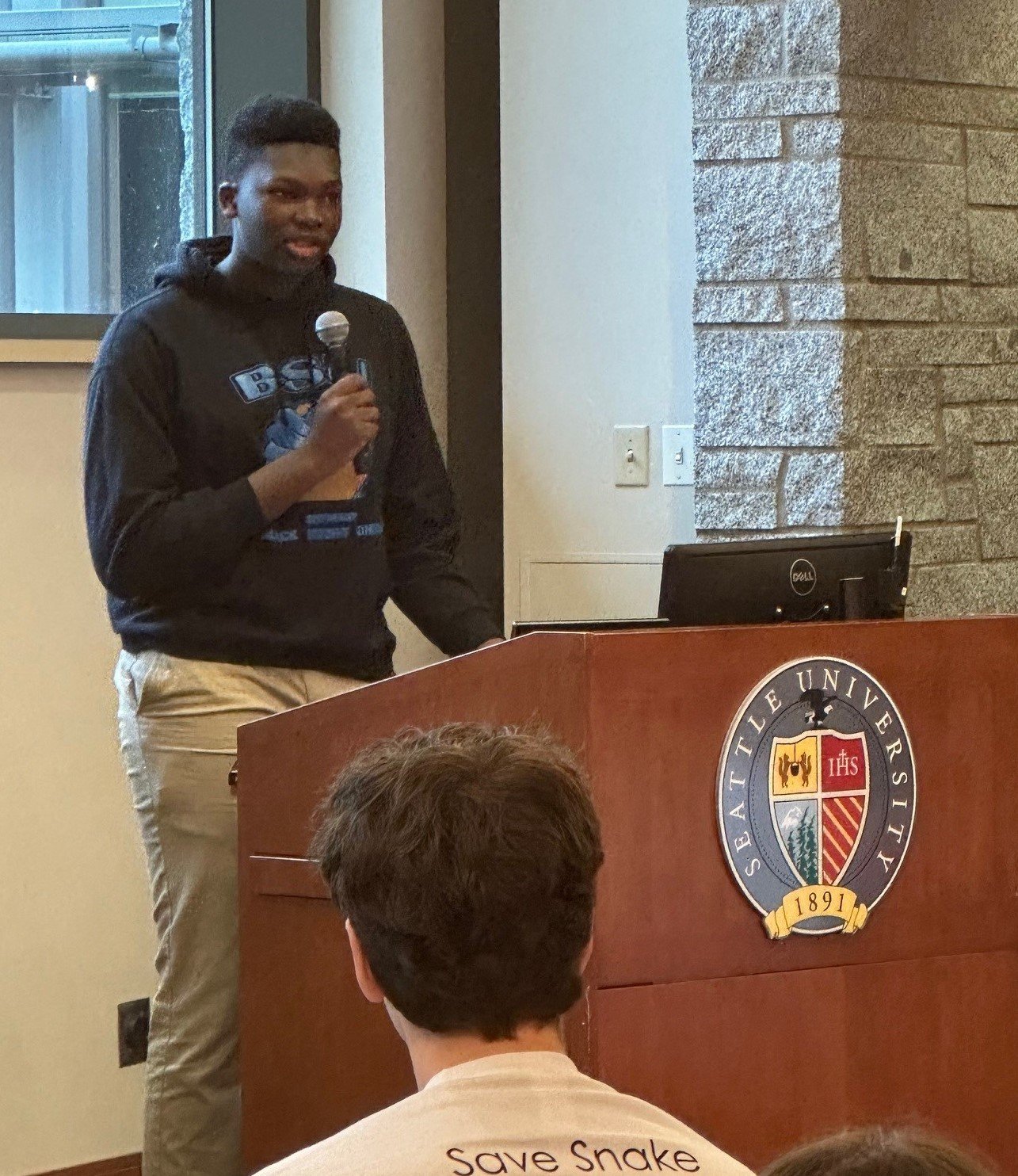SEATTLE — Dozens of students from local Jesuit high schools and Seattle University and representatives from Catholic ministries, climate groups and more joined together to advocate for climate justice at the first Sacred Salmon Town Hall on Feb. 24 at Seattle University.
The town hall centered on the urgency of protecting salmon and over 130 other species, including endangered orcas that depend on salmon for food. It featured student speakers, interfaith leaders, indigenous activists and a representative for U.S. Rep. Pramila Jayapal (D-WA).
Salmon: More than a fish
“I care about this issue because it is so much bigger than salmon. It is about respecting the voices of the tribes who were never considered in the decisions,” said Kenny Ouedraogo, a junior from Seattle Preparatory School and one of several students who shared a reflection at the event. “This issue is about so many things: our moral integrity, our environment, local cultures and what we are as a society.”
Juno Spafford, an environmental studies student at Seattle University, said “the effect of salmon as a keystone species cannot be understated, who described the science behind the demise of the local salmon population.
“Historically, four million salmon usually make it to the Snake River watershed, and today less than 60,000 make it.”
While rising water temperatures, droughts and natural habitat erosion were cited as key reasons for the salmon’s demise, the speakers all pointed to the series of dams across the region that blocks the ability of salmon to return to rivers to spawn.

“Many salmon are being killed from dams because they’re unable to get past them,” said Revery Bean, a 15-year-old student from Bellarmine Preparatory School in Tacoma.
Bean described how the dams affect Native Americans and spoke of tribal members like her grandmother who advocate for tribal fishing rights.
“Native Americans are connected to nature and even created a calendar around salmon,” Bean said. “Dams are heavily affecting Native American culture. We need to get rid of them.”
Taking action
Today, the Columbia River Basin salmon are under threat of extinction, sparking action from faith leaders and lawmakers alike.
In 2022, the bishops of Washington state issued a statement advocating for the lower Snake River ecosystem, writing, “We urge federal and state policymakers to care for creation, address the loss of biodiversity, and ensure the Lower Snake River ecosystem and its neighboring communities are able to thrive.”
Last week, lawmakers announced plans to invest $1 billion to restore native fish and their habitats throughout the Columbia River Basin. The agreement, however, puts off the removal of the Snake River dams.
In a letter to town hall attendees, Congresswoman Jayapal wrote: “I was pleased to see the conclusion of mediation and agreement reached on the Columbia-Snake River system between the Biden-Harris administration, Pacific Northwest tribes and the states of Oregon and Washington. It was a historic agreement that will protect and restore salmon and support tribal nations.”
While the plan was recognized as a good “first step,” Em Wheeler, the emcee of the event and a third-year student at Seattle University, called for more action and “commitment to dam removal for salmon restoration.”
Working together
Faith groups cite the present environmental crisis as an opportunity to respond to the call to “protect our common home,” a phrase that stems from Pope Francis’ encyclical “Laudato Si’” and its follow-up letter, “Laudate Deum.”
“Every one of us is impacted by climate change,” said the Rev. AC Churchill, Earth Ministry/Washington Interfaith Power & Light executive director, who spoke on behalf of the ecumenical faith community. “If something impacts one of us or all of us, we should be working to be part of the solution.”
“We do this work because we know we’re stronger together, because we have common values,” Churchill said. “While we have different spiritual traditions, different faith traditions, different things that ground us and different whys, a lot of us have the same values, the same hopes for a future where we’re not just surviving — where we get to thrive, where we get to go and see the beauty of this creation.”
Bringing it home
Small breakout discussions during the town hall encouraged audience members to share their reflections on the student presentations and brainstorm ways to act in their own communities.
“It gives me more hope and inspires me to continue the work that is sometimes really heard,” said Nora Langan, a climate and justice activist who works with tribes on climate issues. “I can feel the power in the room from these young people, and it’s so important that they feel the urgency too.”
Hanna Nightingale, a teacher at Jesuit High School in Portland, agreed.
“It’s inspiring to see so many young people engaged and motivated to tackle an issue,” she said.